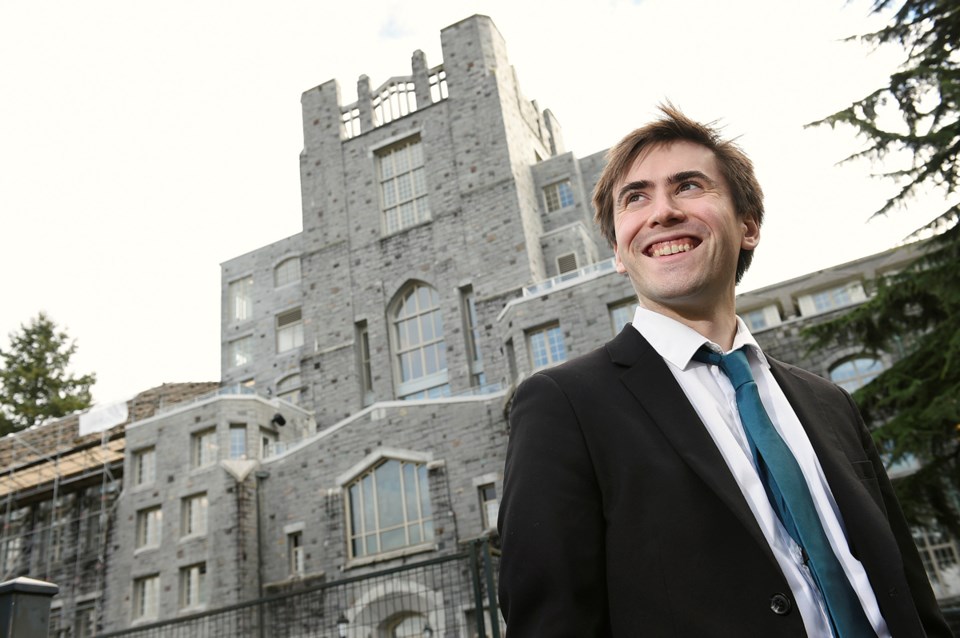A great many Vancouverites — and probably most people in the world — look to one ancient tradition or another as a means to find happiness and fulfilment in life. The Greek and Roman gods may be segregated into the realm of “mythology” — a term that would offend people of faith if ascribed to “living” religions. But one UBC academic suggests the thoughts of the ancients should not be overlooked when people search for meaning and happiness.
Adherents of the Greek and Roman pantheons have disappeared, even as many great architectural wonders built to venerate them remain. And Michael Griffin is not suggesting we return to worshipping Zeus or Juno. But he does think that the wisdom of the ancients can help people today live better lives.
Griffin is a UBC assistant professor of classics and philosophy who was raised in Vancouver and obtained his PhD at Oxford. On Saturday, he will lead a day-long UBC continuing education program called Ancient Philosophies of Happiness, which is open to everyone.
His research focuses on ancient Greek ideas about a well lived life and happiness, and where some of those ideas intersect today in social psychology and cross-cultural psychology.
Not to get too airy-fairy, but what is happiness? And how did it become an end-goal of a meaningful life? In fact, Griffin says, there may be a bit of confusion around the term.
“A psychologist might talk about happiness as in, I’m feeling pretty good today, I woke up, had a coffee I’m feeling happy,” he says. The Greeks had a deeper intention of the word. In fact, the word doesn’t even translate exactly.
The Greek word “eudemonia” is often translated as happiness, but means something more like well-being or human flourishing.
“Similar ideas can be compared in the ancient Indian philosophies or ancient Chinese philosophies, the idea that there is that sort of goal in life, but when we use the word happiness in English, we are talking about a mood,” he says.
Maybe, I wonder, if our shallow appreciation of the word reflects our materialistic culture’s inherently fleeting sense of happiness. We’re always looking for the next thing to make us happy — clothes, vacations, short-attention-span entertainment — instead of appreciating the here and now.
This is where Griffin sees a crossover.
“Money won’t necessarily make us happy, possessions won’t necessarily make us happy,” he says, “but they can play a part in a broader sort of network of influences that might include good friends and close relationships, achievement and opportunity to make a difference in the world, a sense of meaning. These broader themes seem to be the kinds of questions that both psychologists today and ancient philosophers were interested in.”
And while we tend to think of Greek philosophy as something very distinct from the religions of today, which also emerged from the ancient world — Judaism, Christianity, Islam and others — Griffin sees clear connections. Not only did Greek philosophies deeply influence the religions billions of people still practise today, but the Greeks themselves did not recognize a line between their philosophy and what we would call religion.
“The Greeks really had no word for religion because what we might regard anachronistically as religious practice permeated all of Greek culture in a sense and was not singled out as a separate thing,” he says. While this idea may be hard for people in our culture to understand, think of it this way: mindfulness and meditation, for example, emerge from religious roots, Buddhism notably, but they are practised by people of many and no faiths.
“A lot of ancient philosophical traditions outside the European context are very much alive today and cut across religious and secular boundaries,” he says.
Griffin’s course on Saturday will help revive some of the European traditions that may be applicable to life today. For example, he’ll look at the thoughts of Marcus Aurelius, the second-century Roman emperor and Stoic philosopher.
“He was an example of a philosopher-king in antiquity,” says Griffin. While spending much of his life on the frontlines of war, away from home and family, Aurelius kept a journal in which he tried to apply philosophical principles to find meaning and some form of happiness through very difficult times. Showing how these ideas can be applied to modern life, Griffin notes that Nelson Mandela cited Aurelius’s meditations among the things that helped him through his decades of imprisonment and later to forgive his captors.
Of course, Socrates will be there Saturday as well.
“We’ll be looking at some of Socrates’ principles that are maybe still relevant in our idea of what an examined life or a good philosophical life might be,” says Griffin. “For instance, the idea that in exercising our free will or reason, we have to resist the pressures of conformity to our culture or peers, the pressures of authority, especially when it’s illegitimate, and also our own sort of inexorable drive for status and different kinds of appetites.”
When Griffin has run daylong programs like this in the past, they have attracted a broad range of people of all ages and knowledge levels whose only commonality seems to be curiosity.
“Whether somebody was coming at it from a completely nonreligious point of view or somebody who is coming at it with a certain faith tradition in mind, there may be something here for them, ideas about how to examine and apply principles to our everyday life.”
PacificSpiritPJ@gmail.com
@Pat604Johnson



